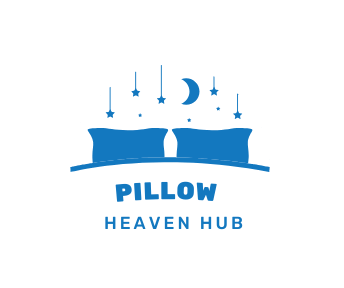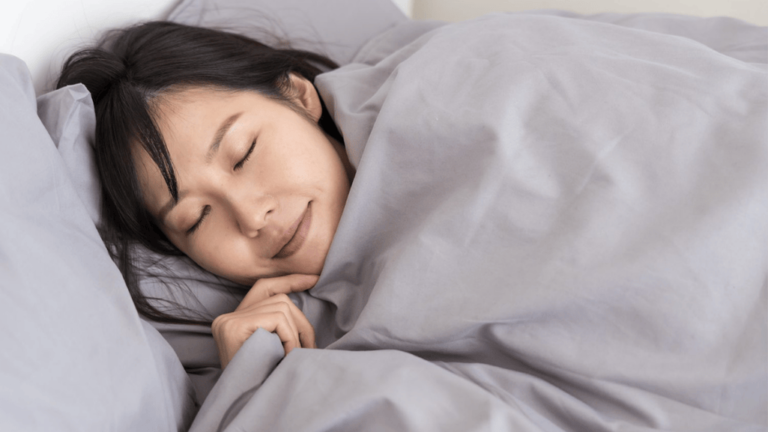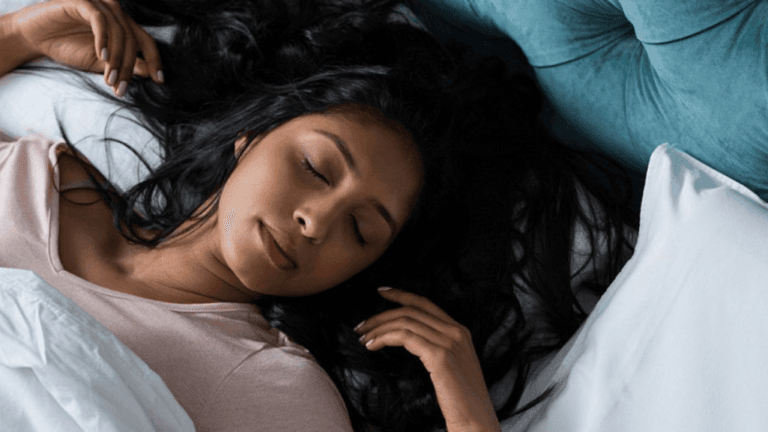More than 60 million Americans struggle with poor sleep quality, which can lead to a host of health issues, including depression, obesity, type 2 diabetes, heart disease, and high blood pressure. While melatonin supplements are a popular choice for those seeking relief, there are plenty of natural sleep aids that can help you achieve a restful night’s sleep without relying on this hormone.
From warm milk and chamomile tea to tart cherry juice and exercise, these natural remedies work in harmony with your body to promote relaxation and improve sleep quality. By creating a sleep-friendly environment with the ideal room temperature between 65 and 72 degrees Fahrenheit, minimizing exposure to smartphone light, and using a flashlight for nighttime bathroom breaks, you can further enhance your ability to drift off into a peaceful slumber.
Discover the power of natural sleep aids and embark on a journey towards better sleep and improved overall well-being. Embrace the benefits of herbal remedies, lifestyle changes, and non-melatonin sleep support to unlock the restful night’s sleep you deserve.
Key Takeaways
- Over 60 million Americans experience poor sleep quality, which can lead to various health problems.
- Natural sleep aids like warm milk, chamomile tea, and tart cherry juice can improve sleep without relying on melatonin.
- Exercise can enhance sleep quality by increasing deep sleep.
- Creating a sleep-friendly environment with the right temperature and minimal light exposure is crucial.
- Herbal remedies and lifestyle changes offer effective non-melatonin sleep support for better rest and well-being.
Understanding the Importance of Quality Sleep
Getting a good night’s sleep is essential for maintaining optimal health and well-being. Quality sleep allows our bodies to repair, recharge, and prepare for the challenges of the upcoming day. When we prioritize sleep and ensure that our sleep-wake cycles align with our natural circadian rhythms, we lay the foundation for a healthier, more balanced life.
The Impact of Poor Sleep on Health and Well-being
The consequences of poor sleep quality extend far beyond feeling tired and groggy. Chronic sleep disturbances can lead to a host of emotional and physical health issues, including:
- Memory problems and difficulty concentrating
- Mood changes and an increased risk of depression
- Heightened risk of obesity, type 2 diabetes, and cardiovascular disease
- Weakened immune system and greater susceptibility to illnesses
According to a meta-analysis of prospective studies, there is a significant relationship between sleep duration and depression among adults. Additionally, research has shown that behaviorally assessed sleep is linked to susceptibility to the common cold, highlighting the importance of quality sleep in maintaining a robust immune system.
Common Causes of Sleep Disturbances
Various factors can contribute to sleep disturbances, disrupting our natural sleep-wake cycles and circadian rhythms. Some of the most common causes include:
- Exposure to unnatural light at night, particularly from electronic devices, which can interfere with melatonin production
- Stress, anxiety, and worry that keep the mind active and alert
- Irregular sleep schedules, such as those experienced by shift workers or frequent travelers
- Consuming stimulants like caffeine or alcohol close to bedtime
- Underlying health conditions, such as sleep apnea or restless legs syndrome
By identifying and addressing these common causes of sleep disturbances, we can take proactive steps to improve our sleep quality and promote a healthier, more restful night’s sleep.
“Sleep is the golden chain that ties health and our bodies together.” – Thomas Dekker
Prioritizing sleep and understanding its crucial role in our overall health is the first step towards achieving a more balanced, energized, and fulfilling life. By making conscious efforts to improve our sleep quality and maintain a consistent sleep schedule, we can unlock the restorative power of sleep and set ourselves up for success in all aspects of our lives.
Exploring Natural Alternatives to Melatonin
For those seeking a restful night’s sleep without relying on melatonin supplements, a world of natural alternatives awaits. Embracing the power of melatonin-free sleep supplements and drug-free sleep enhancers can pave the way to a more refreshing slumber. By turning to the wisdom of nature and harnessing the potential of sleep-promoting botanicals, you can embark on a journey towards enhanced sleep quality and overall well-being.
Herbal Remedies for Better Sleep
Herbal remedies have been used for centuries to promote relaxation and improve sleep quality. Some of the most promising herbs for better sleep include:
- Valerian root: Studies suggest that taking 300 to 600 milligrams of valerian up to an hour before bedtime can aid in falling asleep faster and enhancing sleep quality.
- Lavender: The soothing aroma of lavender essential oil may help individuals unwind and prepare for a restful night’s sleep.
- Chamomile: Herbal teas containing chamomile have been traditionally used to promote relaxation and improve sleep quality.
- Passionflower: This herb has been shown to reduce anxiety and promote a sense of calm, which can be beneficial for those struggling with sleep issues.
Dietary Supplements and Their Role in Sleep Support
In addition to herbal remedies, certain dietary supplements have shown promise in supporting healthy sleep patterns without relying on melatonin. These melatonin-free sleep supplements work by providing the body with essential nutrients that play a role in the sleep-wake cycle.
| Supplement | Potential Benefits | Recommended Dosage |
|---|---|---|
| Magnesium | Magnesium levels influence both sleep quality and quantity, and magnesium supplements may benefit older adults with insomnia. | 200-400 mg daily |
| Glycine | Limited research indicates that up to 30 grams of glycine daily may improve sleep quality and reduce daytime sleepiness in individuals with insomnia symptoms. | 3-5 grams before bedtime |
| L-Theanine | This amino acid found in green tea has been shown to promote relaxation and reduce stress, which can contribute to better sleep quality. | 200-400 mg daily |
It’s important to remember that while natural sleep aids can be effective for many individuals, they may not work for everyone. If sleep difficulties persist, it’s essential to consult with a healthcare professional to rule out underlying health issues and develop a personalized treatment plan.
By exploring the world of melatonin-free sleep supplements and drug-free sleep enhancers, you can embark on a journey towards more restful nights and improved overall well-being. Embrace the power of sleep-promoting botanicals and dietary supplements, and discover the transformative potential of natural alternatives to melatonin.
The Benefits of Chamomile for Sleep
https://www.youtube.com/watch?v=2-EJzkx30ws
Chamomile tea, a caffeine-free herbal infusion, has been used for centuries as a natural sleep aid. This ancient remedy, with its origins dating back 5000 years in China and India, is now enjoyed by millions worldwide who seek a calming and soothing beverage to unwind before bedtime.
The secret to chamomile’s sleep-promoting properties lies in its unique composition of flavonoids, particularly apigenin. These bioactive compounds are believed to interact with benzodiazepine receptors in the brain, which play a crucial role in regulating the sleep-wake cycle. By gently nudging these receptors, chamomile tea may help to promote relaxation and ease the transition into a peaceful slumber.
While scientific evidence supporting chamomile’s effectiveness as a sleep aid is still limited, numerous studies have shown promising results. A Japanese study on rats found that chamomile extract helped the animals fall asleep as quickly as a benzodiazepine medication. Additionally, a study revealed that taking 200 milligrams of chamomile extract capsules daily for 28 days significantly improved sleep quality in elderly participants.
Beyond its potential to enhance sleep, chamomile has also been shown to offer benefits for mental well-being. Research indicates that consuming chamomile extract in doses ranging from 220 to 1100 milligrams daily for 8 weeks can significantly decrease symptoms of generalized anxiety disorder.
“Chamomile tea has been a trusted natural sleep remedy for thousands of years, offering a gentle and safe way to promote relaxation and improve sleep quality.”
Chamomile tea’s popularity as a sleep aid is not surprising, given that 80% of the world’s population and 95% of the developing world rely on herbal medicines for their health needs. The FDA considers chamomile tea to be safe, with minimal risk of side effects when consumed in moderation.
To incorporate chamomile into your bedtime routine, consider the following options:
- Steep a cup of chamomile tea using loose flowers or tea bags for 5-10 minutes before straining and drinking
- Add a few drops of chamomile essential oil to a warm bath or diffuser to create a calming atmosphere
- Take a chamomile extract supplement in the form of capsules or tinctures, following the recommended dosage on the product label
| Chamomile Form | Recommended Dosage | Potential Benefits |
|---|---|---|
| Tea | 1-2 cups daily, 30-45 minutes before bedtime | Promotes relaxation, improves sleep quality |
| Extract capsules | 200-1100 mg daily, divided into multiple doses | Reduces anxiety, enhances sleep |
| Essential oil | 2-3 drops in a diffuser or diluted in a carrier oil for massage | Creates a calming atmosphere, promotes relaxation |
As with any herbal supplement, it’s essential to consult with a healthcare professional before adding chamomile to your sleep routine, especially if you have allergies or are taking medications that may interact with the herb. By incorporating chamomile mindfully and paired with healthy sleep habits, you may discover a natural path to more restful and rejuvenating slumber.
Valerian Root: A Traditional Sleep Aid
For centuries, valerian root has been a go-to herbal sleep aid for those seeking a natural solution to their sleep woes. This ancient remedy, derived from the roots and stems of the valerian plant, has been used since the second century A.D. to ease insomnia, anxiety, and nervous restlessness. Germany’s Commission E has even approved valerian as an effective mild sedative, while the United States FDA lists it as “Generally Recognized As Safe” (GRAS).
Valerian is often considered a safe and gentle alternative to prescription sleep medications. Some studies indicate that taking valerian can help people fall asleep faster and improve the overall quality of their. In fact, research has shown that valerian can be more effective than a placebo in improving sleep after 28 days of consistent use.
How Valerian Root Works to Promote Sleep
The exact mechanism by which valerian root promotes sleep is not fully understood, but it is believed to involve several compounds found within the plant, including valerenic acid and other active ingredients. These compounds are thought to interact with neurotransmitters in the brain, such as GABA, to promote relaxation and reduce anxiety, ultimately leading to improved sleep quality.
Valerian root is often standardized to contain 0.3% to 0.8% valerenic or valeric acid, which are believed to be the primary active compounds responsible for its sedative effects. Additionally, valerian is sometimes combined with other sedating herbs like hops and lemon balm to enhance its effectiveness in treating insomnia.
“Valerian has been shown to have sedative effects in animals, and limited evidence suggests it may improve sleep quality in humans.”
Recommended Dosage and Precautions
While valerian root is generally regarded as safe, it is essential to use it responsibly and under the guidance of a healthcare professional. The recommended dosage for valerian as a sleep aid typically ranges from 300 to 600 milligrams, taken up to an hour before bedtime. However, it is advised not to use valerian for longer than one month without the approval of a healthcare provider.
It is important to note that valerian may interact with certain medications, particularly those broken down by the liver, as well as sedatives, alcohol, and other drugs. Pregnant and nursing women are also advised to avoid taking valerian due to limited safety data. As with any herbal supplement, it is always best to consult with a healthcare professional before incorporating valerian into your sleep routine.
| Study | Sample Size | Dosage | Duration | Outcome |
|---|---|---|---|---|
| Study 1 | 128 participants | Valerian extract | – | Improved sleep quality and reduced nighttime awakenings |
| Study 2 | 8 participants | 450 mg valerian extract | – | Reduced average sleep latency |
| Study 3 | 121 participants | 600 mg valerian extract | 28 days | Decreased insomnia symptoms |
| Study 4 | 75 participants | Valerian extract vs. benzodiazepine | – | Similar improvements in sleep quality, fewer side effects with valerian |
| Study 5 | 16 participants | Valerian extract vs. placebo | – | No significant effect on sleep parameters, except decreased slow-wave sleep onset |
While some individuals may find relief from sleep disturbances by adjusting their sleep environment or, such as sleeping without a pillow, others may benefit from the targeted use of herbal sleep aids like valerian root. As with any approach to improving sleep quality, it is essential to listen to your body, consult with professionals, and make informed decisions based on your unique needs and circumstances.
L-Theanine: The Calming Amino Acid
Discover the power of L-Theanine, a naturally occurring amino acid found in tea leaves, renowned for its ability to promote relaxation and enhance sleep quality. This remarkable compound has gained attention for its potential to reduce stress, anxiety, and improve overall well-being.
L-Theanine is particularly abundant in green tea, with one serving containing approximately 25 to 60 milligrams. Interestingly, green teas generally boast slightly higher levels of L-Theanine compared to black teas. The presence of this amino acid may explain the calming effect many individuals experience when savoring a cup of tea.
The Science Behind L-Theanine and Sleep
Research suggests that L-Theanine supplements can work wonders for sleep quality by reducing the number of times individuals wake up during the night. This makes it a promising natural solution for those struggling with sleep-maintenance insomnia. L-Theanine’s sleep-promoting effects are attributed to its ability to increase alpha brain waves, which are associated with a state of relaxation.
| Dosage | Effects |
|---|---|
| 50 to 200 mg | Increases alpha brain waves, promoting relaxation |
| 200 mg before bedtime | May promote restful sleep |
| Up to 250 mg per serving | Classified as generally recognized as safe by the FDA |
Studies indicate that taking 200 milligrams of L-Theanine before bedtime may foster a more restful sleep experience. Additionally, the FDA classifies L-Theanine as a food ingredient generally recognized as safe in servings up to 250 milligrams, providing peace of mind for those seeking to incorporate this amino acid into their sleep support regimen.
One study showed that L-theanine supplementation improved sleep, stress-related symptoms, and cognitive function.
While more research is needed to fully understand the side effects of L-Theanine when taken independently, its potential to enhance sleep quality and promote relaxation makes it a compelling natural alternative for those seeking improved rest without relying on melatonin.
Magnesium: The Mineral for Relaxation and Sleep
Magnesium, a vital mineral for overall health, has garnered attention for its potential role in promoting better sleep quality. While most individuals obtain sufficient magnesium through a balanced diet, some may turn to dietary supplements to support their sleep needs. Research suggests that magnesium supplementation may be particularly beneficial for older adults struggling with insomnia, as it may help counteract age-related changes in sleep patterns.
According to studies, higher magnesium levels in the body are associated with improved sleep quality, longer sleep duration, and reduced daytime fatigue. Magnesium is believed to influence various brain chemicals, such as NMDA, GABA, melatonin, renin, and cortisol, which play a role in regulating sleep. Experts recommend magnesium glycinate as an easily absorbed form that promotes relaxation and better sleep.
Nearly 50% of US adults and children may not consume the necessary amount of magnesium for their bodies.
The Recommended Dietary Allowance (RDA) of magnesium for adults ranges from 310 to 420 milligrams, depending on factors such as age, sex, and pregnancy status. For sleep purposes, experts advise taking no more than 350 milligrams of magnesium to avoid potential side effects like diarrhea, nausea, and abdominal cramps.
| Magnesium-Rich Foods | Amount per Serving |
|---|---|
| Pumpkin seeds | 156 mg per ounce |
| Chia seeds | 111 mg per ounce |
| Almonds | 80 mg per ounce |
| Spinach, cooked | 78 mg per ½ cup |
| Cashews | 74 mg per ounce |
Incorporating magnesium-rich foods into your diet is a natural way to support sleep quality. Some excellent sources include:
- Seeds (pumpkin, chia)
- Leafy greens (spinach, Swiss chard)
- Nuts (almonds, cashews, peanuts)
- Beans and legumes
- Whole grains (brown rice, quinoa)
- Fish (salmon, halibut)
While magnesium supplements can be a helpful addition to a sleep-supportive lifestyle, it’s essential to consult with a healthcare professional before starting any new supplement regimen, especially for those with kidney disease or other health concerns. Prioritizing a nutrient-dense diet, establishing a consistent sleep schedule, and creating a calming bedtime routine are all crucial components of promoting better sleep quality and overall well-being.
Sleep Supplement Without Melatonin: Combining Natural Ingredients for Optimal Results
For those seeking alternative sleep solutions without relying on melatonin, a carefully crafted blend of natural ingredients can provide the personalized sleep support they need. By combining the unique properties of various herbs, amino acids, and minerals, it’s possible to create a non-habit-forming sleep assistance formula tailored to individual needs.
Creating a Personalized Sleep Support Formula
When designing a personalized sleep support formula, it’s crucial to consider how different natural ingredients can work synergistically to promote better sleep. For example, pairing L-Theanine with magnesium may enhance its calming effects, while adding valerian root extract can further improve sleep quality. Other potential ingredients to consider include:
- Chamomile extract for its relaxing properties
- Passionflower extract to reduce anxiety and promote calmness
- Lemon balm to alleviate stress and improve mood
- Hops extract for its sedative effects
By carefully selecting and combining these ingredients, you can create a targeted formula that addresses your specific sleep concerns without relying on melatonin.
Tips for Choosing the Right Melatonin-Free Sleep Aid
When shopping for a melatonin-free sleep aid, keep the following tips in mind to ensure you select a high-quality product that meets your needs:
- Look for products containing evidence-based ingredients proven to support sleep.
- Choose supplements free from artificial additives, fillers, and preservatives.
- Opt for reputable brands that prioritize transparency and third-party testing.
- Consider your individual sleep concerns and select ingredients that target those issues.
- Consult with a healthcare professional to ensure the supplement is safe for you to use.
| Ingredient | Benefits for Sleep | Recommended Dosage |
|---|---|---|
| L-Theanine | Promotes relaxation and reduces stress | 200-400 mg daily |
| Magnesium | Supports muscle and nerve function, aids in stress reduction | 200-400 mg daily |
| Valerian Root Extract | Improves sleep quality and reduces time to fall asleep | 300-600 mg daily |
| Chamomile Extract | Promotes relaxation and reduces anxiety | 200-400 mg daily |
Finding the right combination of natural ingredients for your personalized sleep support formula may take some trial and error, but the benefits of improved sleep quality and overall well-being are well worth the effort.
By exploring melatonin-free sleep aids and creating a tailored approach to your sleep needs, you can discover the power of natural ingredients in promoting restful, rejuvenating sleep without the potential drawbacks of melatonin supplementation.
Lifestyle Changes to Enhance Sleep Quality
While natural sleep aids can be effective, making simple lifestyle changes can also significantly improve your sleep quality. By focusing on sleep hygiene, creating a conducive sleep environment, and incorporating relaxation techniques into your bedtime routine, you can set the stage for a more restful and rejuvenating night’s sleep.
Establishing a Consistent Sleep Schedule
One of the most important aspects of good sleep hygiene is maintaining a regular sleep schedule. By going to bed and waking up at the same time each day, even on weekends, you can help regulate your body’s internal clock, making it easier to fall asleep and wake up naturally. Aim for 7-9 hours of sleep per night, as recommended by the CDC for adults aged 18-60.
Surprisingly, only 34% of Americans go to bed at the same time each night, which may contribute to the fact that 33% of adults don’t get the recommended amount of sleep. By establishing a consistent sleep schedule, you can join the ranks of those who prioritize their sleep and reap the benefits of improved health and well-being.
Creating a Sleep-Conducive Environment
Your sleep environment plays a crucial role in the quality of your sleep. To optimize your bedroom for better sleep, consider the following factors:
- Temperature: Keep your bedroom cool, ideally between 60-67°F (15-19°C).
- Darkness: Use blackout curtains or an eye mask to block out light, as exposure to light can disrupt your sleep-wake cycle.
- Noise: Use earplugs or a white noise machine to minimize disruptive sounds.
- Comfort: Invest in a supportive mattress and pillows that suit your preferences. Studies suggest that medium-firm mattresses may be beneficial for comfort and avoiding back pain.
By creating a sleep-conducive environment, you can signal to your body that it’s time to wind down and prepare for a restful night’s sleep.
Incorporating Relaxation Techniques into Your Bedtime Routine
Stress and anxiety can make it difficult to fall asleep and stay asleep throughout the night. Incorporating relaxation techniques into your bedtime routine can help calm your mind and body, promoting better sleep. Some effective relaxation techniques include:
- Deep breathing exercises
- Progressive muscle relaxation
- Mindfulness meditation
- Gentle stretching or yoga
Relaxation techniques before bed, such as mindfulness, meditation, deep breathing, or visualization, have been shown to improve sleep quality.
By dedicating just 10-15 minutes to these practices each night, you can help reduce stress, quiet your mind, and prepare your body for a peaceful night’s sleep.
When to Consult a Healthcare Professional
While natural sleep aids and lifestyle changes can be effective in improving sleep quality, it’s crucial to recognize when it’s time to seek professional help. If you’ve been struggling with sleep disorders for an extended period, despite your best efforts, consulting a healthcare professional or sleep specialist is essential.
Chronic insomnia disorder, which affects approximately 10% of the adult population, may require the expertise of a sleep specialist to diagnose and treat effectively. The American Academy of Sleep Medicine recommends Cognitive Behavioral Therapy for Insomnia (CBT-I) as the primary treatment for chronic insomnia in adults.
In some cases, a healthcare professional may prescribe sleep medications. However, it’s important to be aware of the potential side effects and risks associated with these drugs:
- Approximately 8 out of 10 people experience a hangover effect the day after taking sleep medicine.
- Prolonged use of sleeping medicines can lead to rebound insomnia, where insomnia symptoms worsen upon discontinuation.
- Prescription sleep medicines can cause parasomnia, resulting in dangerous behaviors such as sleepwalking, eating, or driving while asleep.
- Benzodiazepines can be addictive and may lead to substance use disorder if used for an extended period.
Certain populations may be more susceptible to the risks associated with sleeping pills and should prioritize non-drug treatments:
| Population | Risks and Considerations |
|---|---|
| Adults 65 and older | Special risks associated with sleeping pills; should first try non-drug treatments |
| Heart patients | Up to 44% may have trouble sleeping; up to 50% of heart surgery patients experience sleep issues for up to six months post-surgery |
| Cancer patients | Increased risk of sleep issues; may benefit from alternative methods before trying sleeping pills |
When consulting a healthcare professional about sleep issues, it’s essential to discuss any underlying medical conditions, medications, and lifestyle factors that may be contributing to your sleep disturbances. By working closely with a sleep specialist, you can develop a personalized treatment plan that addresses your unique needs and helps you achieve the restful, restorative sleep you deserve.
Busting Myths About Natural Sleep Aids
Despite the growing popularity of natural sleep aids, there are still many misconceptions surrounding their safety and effectiveness. While these alternatives to melatonin may offer a more gentle approach to improving sleep quality, it’s essential to separate fact from fiction. By understanding the truth behind common sleep aid myths, you can make informed decisions about your sleep health.
Addressing Common Misconceptions About Melatonin Alternatives
One of the most prevalent misconceptions about natural sleep aids is that they are always safe for everyone to use. Although these supplements generally have fewer side effects compared to prescription medications, they can still interact with other supplements or medications. For example, valerian root may interact with certain antidepressants or sedatives. It’s crucial to consult with a healthcare professional before starting any new sleep aid to ensure its safety and effectiveness for your individual needs.
Another myth surrounding natural sleep aids is that they work instantly. While some people may experience immediate improvements in their sleep quality, others may require consistent use over several weeks to notice the benefits. It’s important to have realistic expectations and give the supplement time to work in harmony with your body. Additionally, combining natural sleep aids with lifestyle changes, such as establishing a consistent sleep schedule and creating a sleep-conducive environment, can further enhance their effectiveness.
Lastly, some individuals believe that natural sleep aids are a one-size-fits-all solution. However, what works for one person may not work for another. Each individual’s sleep needs and body chemistry are unique, so finding the right natural sleep aid may require some trial and error. If you consistently struggle with sleep issues despite trying various safe sleep aids, it’s essential to consult a healthcare professional to rule out underlying health conditions and discuss alternative treatment options.












